Michel Barnier: We are considering the substitution of some national taxes with a common European one
Ralitsa Kovacheva, Adelina Marini, December 5, 2010
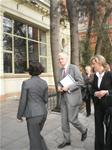 The crisis in the euro area, the banking stress tests and financial regulation, pension reform and restarting the Single Market - those are questions we asked the European Commissioner for Internal Market and Services Michel Barnier during his several-hour visit to Sofia. Within this short and busy visit, Mr Barnier spent half an hour to talk to euinside.
The crisis in the euro area, the banking stress tests and financial regulation, pension reform and restarting the Single Market - those are questions we asked the European Commissioner for Internal Market and Services Michel Barnier during his several-hour visit to Sofia. Within this short and busy visit, Mr Barnier spent half an hour to talk to euinside.
The most interesting issue for us, of course, was the situation in the euro area. Many analysts believe that the current problems in the banking sectors of Ireland and Spain have proved the thesis of insufficient severity of the stress tests conducted this summer. Then the European institutions have been strongly criticised that the stress tests were deliberately "easy" and the results were presented in a manner, aimed at demonstrating the overall stability of the European banking system. According to Commissioner Barnier, the stress tests have shown the resilience of the banking system to sovereign debt:
“We wanted to try to overcome the existing problems in terms of liquidity, 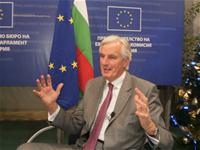 supervision, bank management, where there had been some significant weaknesses. Therefore, we have taken these stress tests [...], in order to asses the stability of banks. To illustrate with an example – as if you want to check whether your house is sufficiently stable in case of an earthquake. In this case we chose certain elements and a steady progress toward resistance is being seen in these tests. This year they were published and they treated the stability of banks in terms of sovereign debt. Of course, we will continue with various other types of tests.”
supervision, bank management, where there had been some significant weaknesses. Therefore, we have taken these stress tests [...], in order to asses the stability of banks. To illustrate with an example – as if you want to check whether your house is sufficiently stable in case of an earthquake. In this case we chose certain elements and a steady progress toward resistance is being seen in these tests. This year they were published and they treated the stability of banks in terms of sovereign debt. Of course, we will continue with various other types of tests.”
Spain is the next country where all eyes are focused on at the moment. Like Ireland, Spain also has serious problems with its banking system, especially with the regional savings banks, the so called “cajas”. But is the problem so serious as to force the country to request funding from EFSF and IMF? The Commissioner delicately avoided answering the question, stressing that Europe was ready to act in solidarity:
“The Spanish government made great efforts – there was a big restructuring in the banking sector and the authorities are making every effort. I can also say that after we have seen the difficulties in Greece some time ago and recently in Ireland, you saw how the Europeans have responded - they all along expressed a desire for a new governance, expressed solidarity and committed to a particular discipline. So this is a chance for Europe, this is how Europe will progress together.”
One of the most frequent criticism of the European institutions and governments at the moment is that in fact not the countries are being saved but their lenders - the big financial institutions, thus forcing taxpayers once again to pay for unreasonable investments. According to Michel Barnier, the work of the European institutions is precisely aimed at this not happening again:
“Today when we talk about the new bank resolution funds, we make these precisely in order the taxpayer not to be required to pay, but banks when there is crisis. Therefore I urged all for solidarity so as to give a chance to businesses and workers. This morning [Friday, December 3] I spoke with your Prime Minister and we also discussed the problem with these bank resolution funds, and we actually received strong support from the Bulgarian state."
 As a result of the crisis, the EU decided to establish new institutions, related to the European financial supervision: the European Board for Systemic Risk (which Mr Barnier again called with his favorite metaphor “the controlling tower”) and the European supervisory authorities: the European Banking Authority, the European Securities and Markets Authority and the European Insurance and Occupational Pensions Authority. The new authorities must begin work early next year. This, however, is questionable because of the failure of the negotiations on 2011 budget between the Council and the European Parliament. Nevertheless, the Commissioner is optimistic: “The decision, which was adopted unanimously by the Council of Ministers, received broad support from MEPs from all groups, including the Bulgarian MEPs. Therefore, I am filled with confidence that on the first of January these three mechanisms will be able to start functioning.”
As a result of the crisis, the EU decided to establish new institutions, related to the European financial supervision: the European Board for Systemic Risk (which Mr Barnier again called with his favorite metaphor “the controlling tower”) and the European supervisory authorities: the European Banking Authority, the European Securities and Markets Authority and the European Insurance and Occupational Pensions Authority. The new authorities must begin work early next year. This, however, is questionable because of the failure of the negotiations on 2011 budget between the Council and the European Parliament. Nevertheless, the Commissioner is optimistic: “The decision, which was adopted unanimously by the Council of Ministers, received broad support from MEPs from all groups, including the Bulgarian MEPs. Therefore, I am filled with confidence that on the first of January these three mechanisms will be able to start functioning.”
When it comes to EU's budget, one of the most discussed issues at the moment is whether new own revenue sources to be introduced. One idea is this to be a banking tax (on financial transactions or on financial activities). However, this is a subject of much controversy both in terms of the object of taxation and terms of the timing - whether it is the right time to introduce a common euro tax. According to Commissioner Barnier, it is not about further increases of the tax burden of Europeans, but rather about the substitution of certain national taxes with a common European one:
“Together with my fellow Commissioners we are considering whether there is 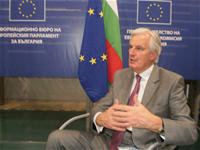 an opportunity to have our own resources for the budget. This is not about to impose new taxes or to increase taxes - but rather, perhaps, some national taxes to be paid into a fund which will form the budget. But this of course is still being debated and could be decided at an EU summit further in the future, to have own resources without imposing new taxes. We are actually considering the substitution of some national taxes with a common European one. Everything is in a process of negotiations which are not easy at all.”
an opportunity to have our own resources for the budget. This is not about to impose new taxes or to increase taxes - but rather, perhaps, some national taxes to be paid into a fund which will form the budget. But this of course is still being debated and could be decided at an EU summit further in the future, to have own resources without imposing new taxes. We are actually considering the substitution of some national taxes with a common European one. Everything is in a process of negotiations which are not easy at all.”
The pension reforms in EU Member States are also a subject with which Michel Barnier was involved. The ongoing reforms are a matter of decision of each country, but they are monitored vigilantly by the Commission, because "now we see that people live more years, long lives are now a fact and this may lead to budgetary problems in some Member States. Fairer pension systems are needed. Many countries have undertaken reforms such as Spain, France, Portugal, Germany.” Regarding the request of 9 European countries the cost of pension reforms to be removed from the budget deficit, Barnier said that the real deficit of the Member States must be determined first and also the link with the indebtedness to be taken into account:
“The European Commission still does not have a definite opinion, because at this stage analyses are being made of the real deficit in the Member States. Consideration should be given to the problem of indebtedness and only when we have additional elements, perhaps the European Commission will be able to say something more definite.”
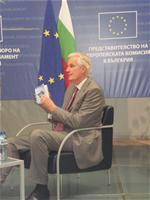 Recently Mr Barnier presented the Single Market Act, which included 50 proposals of how to restart the single market in different areas. Public consultations on the matter will continue until February 2011, then the Commission will provide more specific initiatives which are expected to be adopted by the end of 2011. According to Mr Barnier, the objective is “SMEs to benefit especially from the single market, but also savers, craftsmen, business, business. So this is not about a wild competition, but rather a managed competition in which public services will not be deleted, they will be guaranteed by each Member State for the most vulnerable parts of the population.”
Recently Mr Barnier presented the Single Market Act, which included 50 proposals of how to restart the single market in different areas. Public consultations on the matter will continue until February 2011, then the Commission will provide more specific initiatives which are expected to be adopted by the end of 2011. According to Mr Barnier, the objective is “SMEs to benefit especially from the single market, but also savers, craftsmen, business, business. So this is not about a wild competition, but rather a managed competition in which public services will not be deleted, they will be guaranteed by each Member State for the most vulnerable parts of the population.”
The purpose of Mr Barnier's visit in Bulgaria was exactly to examine the 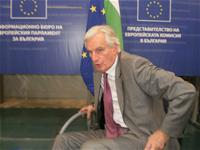 enforcement of EU legislation with regard to the internal market. According to Bulgarian government's press office, “the only observations of the Commissioner to Bulgaria were with respect to the public procurement law”. At a briefing in the Council of Ministers Michel Barnier said: “I hold firmly all procurement rules to be respected. I will fight uncompromisingly for that [...] Personally, I have confidence in the work of Bulgaria, but there must be transparency in all actions. Everything in the European Union must be applied and controlled with the expected discipline.”
enforcement of EU legislation with regard to the internal market. According to Bulgarian government's press office, “the only observations of the Commissioner to Bulgaria were with respect to the public procurement law”. At a briefing in the Council of Ministers Michel Barnier said: “I hold firmly all procurement rules to be respected. I will fight uncompromisingly for that [...] Personally, I have confidence in the work of Bulgaria, but there must be transparency in all actions. Everything in the European Union must be applied and controlled with the expected discipline.”
Public procurement was a subject to the sharpest criticism in the annual report of the European Commission on Bulgaria's progress under the Cooperation and Verification Mechanism (CVM) in July. According to data submitted to Brussels by the Bulgarian authorities, irregularities have been established in 60% among all verified tenders. “This rate reaches almost 100% for large public infrastructure projects where the authorities have an obligation of ex-ante control.” The reasons, according to the Commission, are frequent changes in the legal framework and in implementing procedures in the past year, conflict of interest, local favouritism and frequent recourse to direct attribution of contracts in situations where tender procedure should be applied. The Commission recalls that it has repeatedly stated these weaknesses and has made concrete proposals for corrective action.
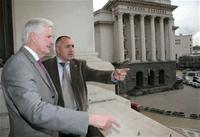 Then (21 July), Prime Minister Boyko Borissov has committed to an entirely new public procurement law to be prepared in 3 months. The law, however, is still not a fact, though according to the Minister of EU funds management Tomislav Donchev, it is a "super-priority" for the state. “Today I understood from your Prime Minister that Bulgaria already has such a law and is making certain amendments to procurement”, Barnier said to euinside, without specifying whether he meant a completely new law. According to the government's press office, Michel Barnier had been assured by the Bulgarian Prime Minister that new legislation in this area was being prepared. It is expected the concept of the new law on public procurement to be ready by December 15.
Then (21 July), Prime Minister Boyko Borissov has committed to an entirely new public procurement law to be prepared in 3 months. The law, however, is still not a fact, though according to the Minister of EU funds management Tomislav Donchev, it is a "super-priority" for the state. “Today I understood from your Prime Minister that Bulgaria already has such a law and is making certain amendments to procurement”, Barnier said to euinside, without specifying whether he meant a completely new law. According to the government's press office, Michel Barnier had been assured by the Bulgarian Prime Minister that new legislation in this area was being prepared. It is expected the concept of the new law on public procurement to be ready by December 15.